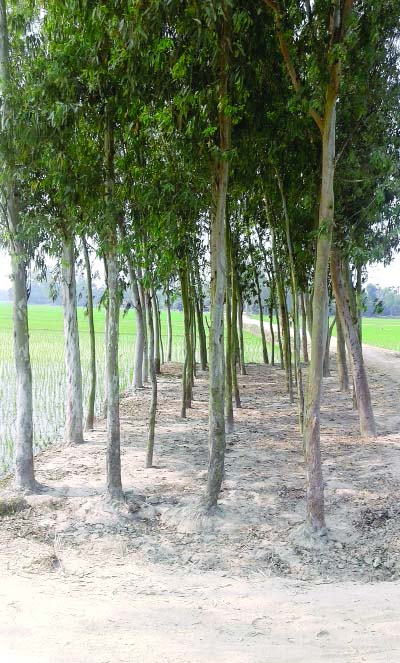
Staff Reporter , Rangpur :
Plantation of eucalyptus tree is increasing alarmingly at different upazilas in Rangpur district, posing serious harm to environment, cultivable land and human health.
According to sources, the nurseries in the region are producing and selling saplings of the harmful tree defying a ban on it.
Environmentalists and agriculturists say that eucalyptus, originating in Australia, is highly injurious to our environment largely because its rate of transpiration is awfully high. Pollen emission from its flowers is also high, which may cause respiratory problems to humans, they said.
The eucalyptus plantation in the region is so widespread that it can easily be found in large numbers on almost every yard, office premises, by the roadsides and along the railway tracks.
Sources said that people prefer it mainly owing to its rapid growth and demand for its cheap timber and fuel wood in the rural areas.
According to DAE, Rangpur official sources a eucalyptus tree absorbs water 18-20 times more than any other tree in the country. It also causes damage to soil fertility, so it is detrimental to cultivable land. It is also harmful for other trees.
Divisional Forest Officer, Rangpur Rafiquzzaman Shah said in 1995 when its bad effects were detected, the ministry of environment and forest in an official order asked the forest department to exclude eucalyptus from its afforestation programme and inform the people about its effects on the environment. But by then, the situation was already out of control as nurseries around the country produced and sold the saplings in plenty.
People are also interested in its cultivation as they get quick return from the tree compared to other wooden trees. The government and non-government organisations should take up awareness campaigns to inform people about its bad effect, he added.
A number of nursery owners alleged that they grow the saplings of eucalyptus as they get much profit. They are aware of the adverse effect of the tree but they have to grow and sell it for the sake of better business.
Plantation of eucalyptus tree is increasing alarmingly at different upazilas in Rangpur district, posing serious harm to environment, cultivable land and human health.
According to sources, the nurseries in the region are producing and selling saplings of the harmful tree defying a ban on it.
Environmentalists and agriculturists say that eucalyptus, originating in Australia, is highly injurious to our environment largely because its rate of transpiration is awfully high. Pollen emission from its flowers is also high, which may cause respiratory problems to humans, they said.
The eucalyptus plantation in the region is so widespread that it can easily be found in large numbers on almost every yard, office premises, by the roadsides and along the railway tracks.
Sources said that people prefer it mainly owing to its rapid growth and demand for its cheap timber and fuel wood in the rural areas.
According to DAE, Rangpur official sources a eucalyptus tree absorbs water 18-20 times more than any other tree in the country. It also causes damage to soil fertility, so it is detrimental to cultivable land. It is also harmful for other trees.
Divisional Forest Officer, Rangpur Rafiquzzaman Shah said in 1995 when its bad effects were detected, the ministry of environment and forest in an official order asked the forest department to exclude eucalyptus from its afforestation programme and inform the people about its effects on the environment. But by then, the situation was already out of control as nurseries around the country produced and sold the saplings in plenty.
People are also interested in its cultivation as they get quick return from the tree compared to other wooden trees. The government and non-government organisations should take up awareness campaigns to inform people about its bad effect, he added.
A number of nursery owners alleged that they grow the saplings of eucalyptus as they get much profit. They are aware of the adverse effect of the tree but they have to grow and sell it for the sake of better business.

